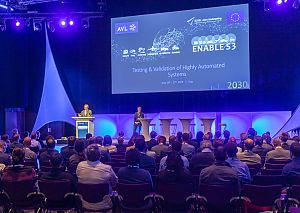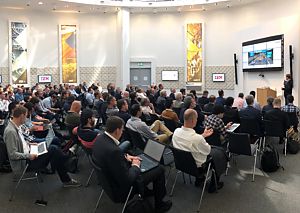ENABLE-S3
Short Description

The aim of the ENABLE-S3 project was to provide the resources required but which had not been available previously for Verification & Validation (V&V) of Automated Cyber-Physical Systems (ACPS).
In terms of automated driving, Winner et.al. [2] and Wachenfeld et.al. [3] predict that more than 100 million road kilometres would be required as statistical evidence that an automated vehicle is just as safe as one driven manually. This means that "proven-in-use" certification, which mainly involves testing on the road, is simply not feasible. Similar statements also apply to other application domains.
One possible solution involves identifying relevant test scenarios and using virtual validation. In ENABLE-S3, industry and research partners from various application domains (automotive, aerospace, rail, shipping, healthcare and agriculture) joined forces to develop the technology bricks required for virtual V&V of automated cyber-physical systems.
The ENABLE-S3 partners agreed on a virtual approach to verification and validation based on different scenarios. This means that the main test effort is largely shifted to a virtual environment represented by models. This has multiple advantages: tests can be carried out at a much earlier stage and in a more cost-effective and more reliable and reproducible manner. Tests are described in scenarios.
The following definition (across all application domains) was formulated within the project:
A scenario class is a formalized description of the multi-actor process, including its static environment, its dynamic environment and environmental conditions. In a scenario class, the parameters are described and may have parameter ranges or distributions. A scenario class may include activities, events, goals of the activity and decisions of actors.

The project does not aim for a common, generic software solution due to the large number of project partners and application domains involved. The focus instead was on developing a common methodology, a basic validation tool chain architecture and a series of reusable technology bricks (tools, methods, models, etc.) that can be used for building a test environment for a specific use case.
It was split into two parts due to the wide scope and complexity of the problem. The validation methods specify the steps and analyses necessary for data collection and storage and for selecting scenarios and metrics as well as test generation methods. Scenarios are an integral aspect of the scenario-based approach to validation.
There are a large number of possible scenarios that can either be extracted from the data that are recorded or that are generated synthetically (e.g. based on safety analyses). The reality is characterised by a large number of scenario variations (e.g. for different weather conditions, cultural differences, etc.). This results in a huge number of test cases.
The aim therefore must be to provide smart methods that ensure sufficient test coverage with the smallest possible number of test cases and to decide which test cases should be executed in which test environment.
The validation platform, on the other hand, focuses on reusable validation technology bricks (tools and models) that can support different development and test environments seamlessly (model-in-the-loop, hardware-in-the-loop, system-in-the-loop such as vehicle-in-the-loop, as well as real-world testing).
Publications
Brochure: Digital Technologies (2024)

Ready for the Future: Smart, Green and Visionary. Project Highlights of the Years 2016 to 2021.
FFG: Olaf Hartmann, Anita Hipfinger, Peter Kerschl
Publisher: Federal Ministry for Climate Action, Environment, Energy, Mobility, Innovation, and Technology
English, 72 Seiten
Publication Downloads
Project Partners
Consortium leader
AVL List GmbH
Additional consortium partners
- Aalborg University
- AIRBUS GROUP INNOVATIONS
- Austrian Institute of Technology GmbH
- AVL Deutschland GmbH
- AVL Software & Functions GmbH
- BTC Embedded Systems AG
- Cavotec Germany GmbH
- Creanex Oy
- Czech Technical University
- Deutsches Zentrum für Luft- und Raumfahrt e.V.
- DENSO Automotive Deutschland GmbH
- Dr. Steffan Datentechnik GmbH
- Danmarks Tekniske Universitet DTU Denmark
- EVIDENCE SRL
- FZI Research Center for Information Technology
- GMV Aerospace and Defense S.A.U.
- GMVIS SKYSOFT S.A.
- Politechnika Gdańska ul. Narutowicza
- HELLA Aglaia Mobile Vision GmbH
- IBM Ireland Limited, imec
- INRIA, INSTITUTO SUPERIOR DE ENGENHARIA DO PORTO
- Instituto Tecnologico de Informatica
- IXION Industry and Aerospace SL
- Johannes Kepler University Linz
- Linz Center of Mechatronics GmbH
- MAGILLEM DESIGN SERVICES SAS
- Magneti Marelli S.p.a
- Microelectronica MASER S.L.
- Apsys
- Model Engineering Solutions GmbH
- Magna Steyr Engineering AG & Co KG
- Nabto ApS, Navtor AS
- NM robotic GmbH, NXP Semiconductors Germany GmbH
- OFFIS e.V.
- Philips Medical Systems Nederland B.V.
- Rohde & Schwarz GmbH & Co. KG
- Reden B.V., Renault S.A.S.
- Rugged Tooling Oy
- Serva Transport Systems GmbH
- Siemens Industry Software NV, University of Southampton
- SafeTRANS e.V.
- Thales Alenia Space Espana S.A.
- Fundación Tecnalia Research & Innovation
- THALES Austria GmbH
- Thatcham Research
- TOYOTA MOTOR EUROPE
- TNO
- TTControl GmbH
- TTTech Computertechnik AG
- Eindhoven University of Technology
- Technische Universität Darmstadt
- Technische Universität Graz
- TWT GMBH SCIENCE & INNOVATION
- University College Dublin
- Universidad de Las Palmas de Gran Canaria
- University of Modena
- Universidad Politécnica de Madrid
- Valeo Autoklimatizace k.s.
- VALEO Schalter und Sensoren GMBH
- Virtual Vehicle Research Center mbH
- VIRES Simulationstechnologie GmbH
- VTT Technical Research Centre of Finland
- Tieto Finland Oy
- University of Zilin
